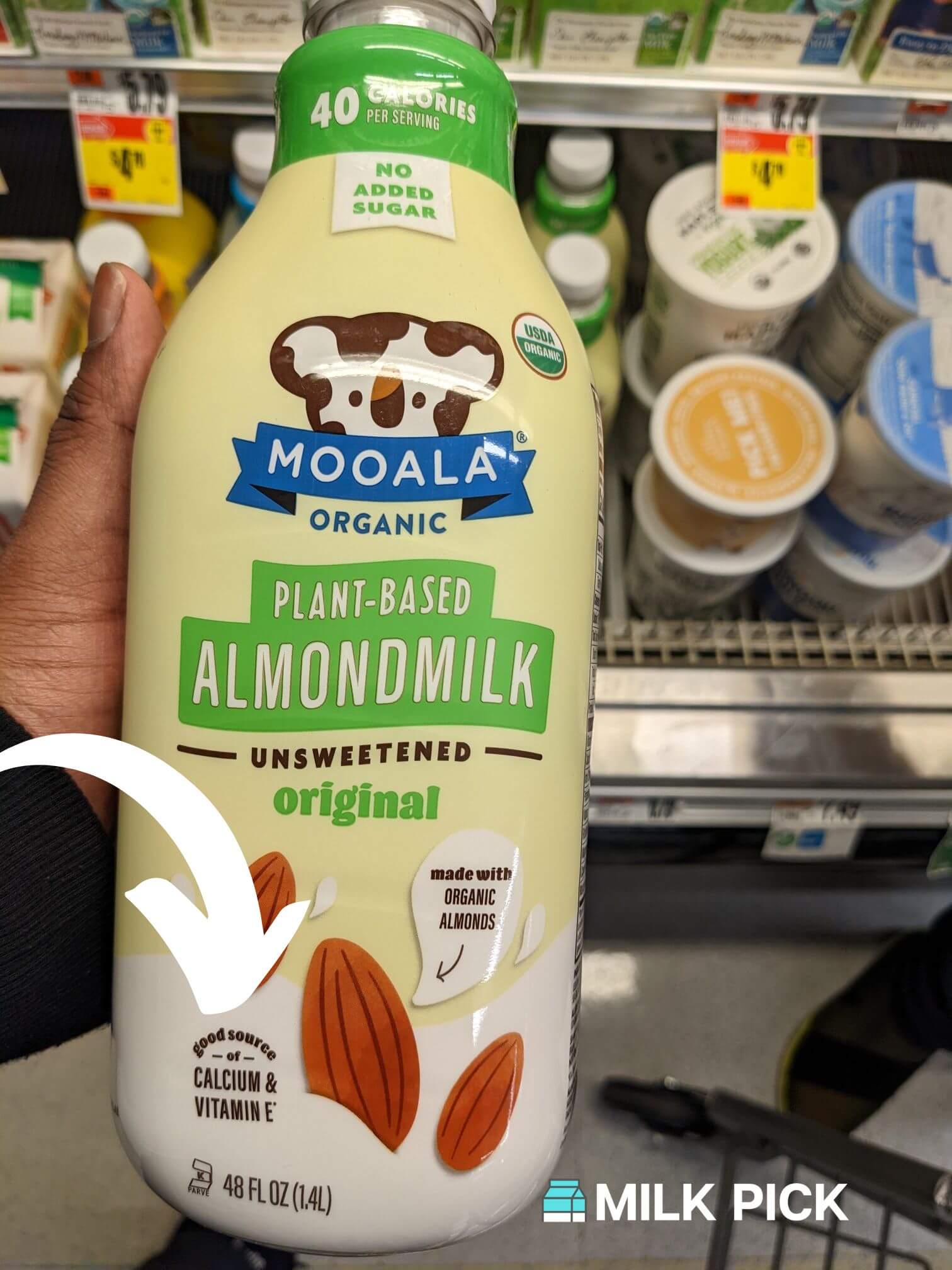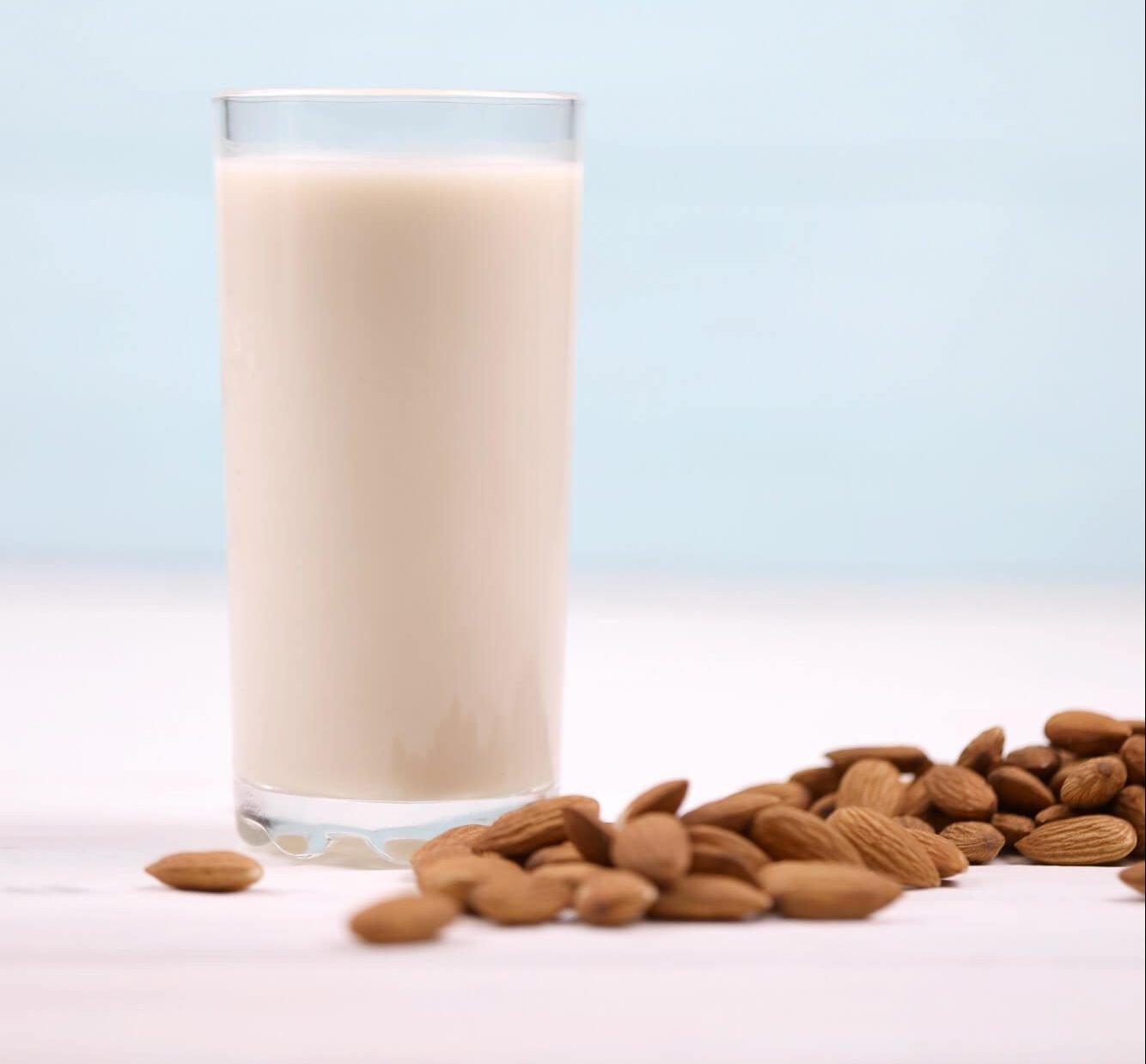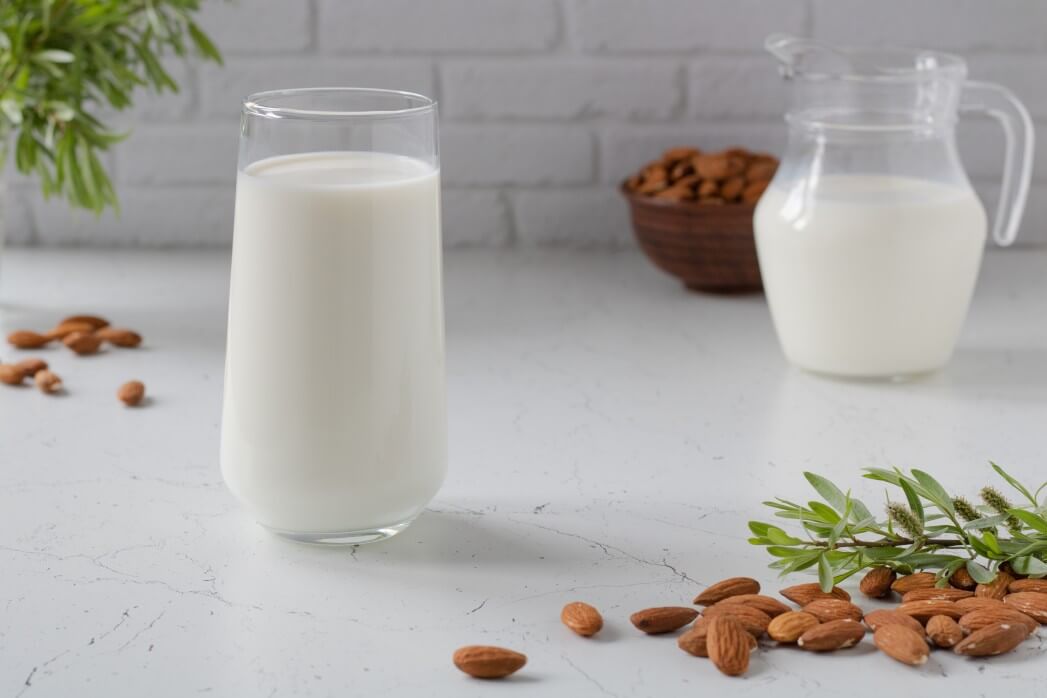Almond milk is popular plant-based milk that is often touted for its health benefits.
This dairy-free milk alternative is becoming increasingly popular due to its low-calorie count and vegan-friendly nature. But can this nut milk help with more than just dietary restrictions?
Is almond milk good for cholesterol?
The short answer is yes.
Almond milk is an excellent choice if you are concerned about your cholesterol. It has zero saturated fat and can help lower low-density lipoproteins “bad” cholesterol.
Read on for an in-depth breakdown of how almond milk can help your cholesterol levels.
How Does Almond Milk Help Cholesterol?
According to Harvard, almonds contain plant sterols, which can help to block the absorption of cholesterol and bile acid.
This can potentially reduce cholesterol levels by limiting the amount of cholesterol that can enter your body.
Plant sterols, also referred to as phytosterols, are naturally found in almonds and almond milk.
Phytosterols have been proven to help control blood cholesterol levels and reduce your risk for heart disease, stroke and heart attack.
Expert Insight
Almond milk can definitely be included in one's diet without worsening cholesterol levels.
This is because regular, unsweetened almond milk does not contain any cholesterol. Almond milk is also lower in calories then a glass of 2% or even fat free cow's milk.
For instance, per eight ounce serving, unsweetened almond milk contains ~30 calories, 3g total fat (none of which are from saturated or trans fats), and 0mg cholesterol.
Compare this to fat free cow's milk which has about 80 calories, 0g total fat, and 4.8 mg cholesterol. Fortified almond milk is also 63% higher in calcium compared to fat free milk and is rich in vitamin E.
The only areas that cow's milk outshines almond milk are in the amount of protein and potassium per serving (almond milk has 1g versus 8g protein in cow's milk and 170 mg potassium versus 382 mg potassium in cow's milk).
However if your goal is to keep dietary cholesterol intake low, almond milk is a great choice.
And even though almond milk does have 3g of total fat, this is in the form of mono- and polyunsaturated fatty acids.
Studies show that replacing saturated and trans fats in your diet with unsaturated fats such as these can help lower LDL cholesterol levels in your blood.
By accomplishing this, you're also reducing your risk of cardiovascular disease, including atherosclerotic heart disease and also lowering inflammation. An example of this type of eating style is the Mediterranean Diet, which is higher in mono- and polyunsaturated fats and low in saturated and trans fats.

Kiran Campbell, RD
Registered Dietitan & Creator at Kiran Campbell Nutrition
How Do Plant Sterols Work?
Phytosterols are plant compounds that structurally resemble cholesterol and can compete with cholesterol for absorption in the digestive system.
When your body processes phytosterols instead of the cholesterol, some cholesterol is removed as waste, resulting in lower cholesterol levels and improved cardiovascular health.
Consuming plant sterols can also assist in the prevention of diabetes, obesity and cancer.
Check out this video for a deeper explanation of plant sterols and how they can help your cholesterol.
Is Almond Milk Good For Lowering High Cholesterol?
Yes, If you are working towards lowering your cholesterol, this is a great milk to implement into your diet. Almond milk is rich in polyunsaturated fatty acids, which have been shown to reduce low-density lipoproteins (LDL), the "bad" cholesterol.
A study in healthy adults showed that eating 66g of almonds or almond oil daily for six weeks reduced their levels of low-density lipoprotein, or “bad,” cholesterol by 6%.
Expert Insight
Almond milk is a great alternative for someone looking to lower their cholesterol.
Almond milk contains zero grams of saturated fat and no cholesterol. Almond milk contains polyunsaturated fats, which may lower your “bad” cholesterol (LDL).
According to the American Heart Association, polyunsaturated fats can not only help reduce your LDL levels but also reduce your risk of heart disease and stroke. Almond milk also contains a small amount of fiber.
Fiber helps reduce your body’s ability to absorb cholesterol and instead helps your body get rid of it.
Studies have shown that eating nuts, including almonds, regularly is linked to a lowered risk of heart disease. One reason for this is because they are higher in healthful fats like polyunsaturated fat.

Ashley Kitchens, MPH, RDN
Plant-based dietitian & owner of Plant Centered Nutrition
High cholesterol is a condition in which the body produces too many low-density lipoproteins (LDL) and does not remove enough good cholesterol from your blood.
This can lead to the narrowing of arteries due to their thickening walls and an increased risk for heart disease, stroke, and heart attack.
However, when you consume polyunsaturated fatty acids (like those found in almond milk), you can decrease the amount of LDL in your body, lowering your cholesterol.
Related: Is Almond Milk Good For Arthritis?
Vitamin E in Almond Milk
Vitamin E is a nutrient that's often overlooked, but it's actually quite important for overall health (particularly for seniors).
Vitamin E, a fat-soluble antioxidant, helps protect your body from free radical damage. Free radicals are molecules that can damage cells, tissues, and organs.
A small study on people with high cholesterol showed that individuals with vitamin E in their diet lowered their LDL cholesterol (bad cholesterol) levels after five months.
Just one cup of commercial almond milk provides up to 110% of the daily value of vitamin E.

But the positive effects don’t end there. Not only does almond milk provide vitamin E, but it will also help your body absorb it.
Almonds produce antioxidant flavonoids that work with vitamin E, improving artery health and inflammation.
Related: Is Almond Milk Anti-Inflammatory?
Other Benefits Of Vitamin E
In addition to its well-known role in supporting heart health, vitamin E helps maintain healthy skin and eyes and boosts your immune system.
Some research has suggested that vitamin E might help delay the progression of Alzheimer's disease in people diagnosed with mild to moderate conditions.
Vitamin E is also proven beneficial for people with preeclampsia, prostate cancer, and liver disease.
Is Almond Milk Good For Triglycerides
A study in healthy adults showed that consuming 66g of almonds or almond oil every day for six weeks reduced their levels of triglycerides by 14%. Adding almond milk to your diet can help you achieve these numbers.
Triglycerides are a type of fat (lipid) found in your blood.
When you eat, your body converts any calories it doesn't need to use right away into triglycerides.
The triglycerides are stored in your fat cells, and later, hormones release triglycerides for energy between meals.
If you regularly surpass your caloric needs, your fat cells will not be able to release the excess energy quickly enough, creating a fat build-up.
While triglycerides and cholesterol are two different things, they are both lipids found in the blood that can significantly affect your heart health.
High triglycerides combined with high cholesterol raise your risk of heart attack, strokes and pancreatitis.
How Does Almond Milk Lower Triglycerides?
Almond milk can lower triglycerides through omega-3 fatty acids.
Although omega-3 fatty acids are essential for good health, the body cannot create them independently and relies on you to absorb them through food.
These unsaturated fats have proven to lower blood triglyceride levels and slightly improve your high-density lipoprotein (good cholesterol).

Which Almond Milk is Best For Cholesterol?
Not all almond milk is created equal.
When it comes to taking care of your cholesterol, you’ll want to ensure that the milk you choose has pure and natural ingredients.
While some flavored options may taste delicious, they will not carry the same beneficial qualities as pure almond milk.
When buying almond milk, make sure you purchase:
- Unsweetened almond milk
- Organic almond milk
- Almond milk free of carrageenan
Related: Is Almond Milk Good for Ulcers?
Choose Unsweetened Almond Milk
To get the most out of your almond milk, look for brands that offer unsweetened versions made with whole almonds.
Many brands on the market are loaded with added sugar, which can negate any health benefits.
When you consume sugary foods and drinks, your liver produces more low-density lipoproteins, meaning it creates more bad cholesterol in your body.
If you're looking for a beverage to help your cholesterol levels make sure you stick to unsweetened almond milk.
Go Organic
Glyphosate ( a carcinogen) is an active ingredient in many popular herbicides that have been widely used to treat almonds.
While it is unclear what brands typically use this chemical, the best way to avoid this is to stick with organic almond milk, preferably brands that state they are certified glyphosate-residue-free.
Watch Out For Carrageenan
Carrageen is a common ingredient that is frequently used as a thickening agent.
Scientists have long been concerned about the safety of carrageenan, a food additive derived from red algae.
Although it has been used for centuries as a thickener and stabilizer, recent evidence suggests it is highly inflammatory and toxic to the digestive tract.
Carrageenan has been linked to colitis, irritable bowel syndrome, rheumatoid arthritis, and colon cancer.

Make Your Own Almond Milk at Home
While it may take a little bit of effort, making your almond milk at home can ensure it's fresh and free from additives.
You only need a blender, a nut milk bag, some almonds, and water to make your own almond milk. Here's how to do it:
Soak 1/2 cup (65 grams) of raw almonds overnight. In the morning, drain the almonds and add them to a blender with 2 cups (473 mL) of water. Blend until the mixture is milky and creamy.
Pour the mixture into a nut milk bag and strain over a large jug or bowl. Squeeze out any excess moisture until most of the milk is separated from the pulp.
You can make your almond milk thicker or thinner by adjusting the quantity of water. If you want to enhance the flavor, you may want to add a pinch of salt or a drizzle of honey.
You can keep the milk for up to 5 days in the refrigerator. Enjoy!
For our visual friends, here's our video that shows how to make almond milk.
Other Benefits of Almond Milk
- Low in calories: almond milk typically contains fewer calories than regular milk. One cup of almond milk has about 30-40 calories, while one cup of regular milk has 103 calories. That's a significant difference!
- Zero saturated fat: Although almond milk contains a significant amount of fat, it is important to note that none of this fat is saturated or trans fat.
- Naturally low in carbs: Unsweetened varieties of almond milk are naturally low in carbohydrates which can help with your sugar consumption.
- Good source of calcium: A cup of almond milk contains about 30% of the calcium you need daily. Some brands of almond milk are fortified with other vitamins and minerals, such as vitamin D, zinc, and copper.
- Supports your gut health: Almond milk is an excellent source of prebiotics. Prebiotics are a type of dietary fiber that promote the growth of good bacteria in the gut.
Want to learn more about almond milk? Check out our Almond Milk 101 video!
Almond Milk is Cholesterol-Friendly!
If you were asking yourself, is almond milk good for cholesterol, by now, you have gathered that the answer is yes.
The vitamins and fatty acids found in almond milk have been proven to lower high cholesterol levels and decrease the amount of “bad” cholesterol in the body.
To get the best benefits from this nutritious beverage, make sure you source a brand with clean and natural ingredients.

